Knee And Shoulder Replacement: Surgery, Cost, Procedure, Treatment And Side effects
Knee and Shoulder pain are the most common issues faced by people these days. Many types of minor shoulder and knee pain respond well to self-care measures. However, dismissing knee and shoulder pain, whether from an injury or degenerative condition, may result in more pain and reduced movement. The best thing to do is to consult an experienced Orthopaedic specialist.
But before you do that, here’s everything you need to know about Knee & Shoulder Replacement.
Knee and Shoulder Pain

The shoulder joint is the most flexible in the body, allowing for seven essential movements such as flexion, extension, external rotation, and 360° circumduction.
Our knees, on the other hand, provide support. The knee joint is the joint that links the upper and lower leg. It is required for almost all types of leg movement. Our knees keep our bodies’ upright and aid in the lowering and raising of the body. Ensures stability
Strong knees and shoulders are essential to our body’s balance and movement. And, considering the amount of work they do, it’s only inevitable that they’ll wear out over time.
Common Shoulder Problems
- Inflammation of the tendon (bursitis or tendinitis) or a tendon tear
- Instability
- Arthritis
- Fracture (broken bone)
Common Knee Problems
- Sprained or strained ligaments,
- Cartilage tears,
- Tendonitis and
- Arthritis.
Knee discomfort is most commonly caused by aging; wear and tear over time can result in pain, stiffness, and inflammation. Overweight people, athletes, and people who work in jobs that involve a lot of heavy lifting for long periods are all at risk for knee pain.
Knee pain can be classified into three groups:
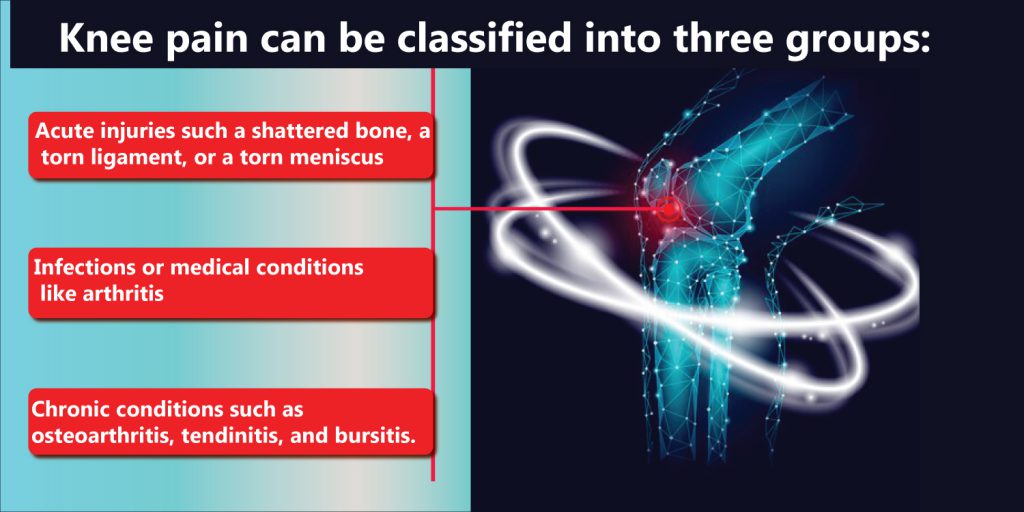
- Acute injuries such a shattered bone, a torn ligament, or a torn meniscus
- Infections or medical conditions like arthritis
- Chronic conditions such as osteoarthritis, tendinitis, and bursitis.
Surgery is not always the only option, contrary to popular opinion. You could try a range of non-invasive treatments before undergoing surgery. Physical therapy, anti-inflammatory medications, cortisone, and hyaluronic acid injections are just a few of the treatments your doctor may recommend.
Why shoulder & knee replacement surgery
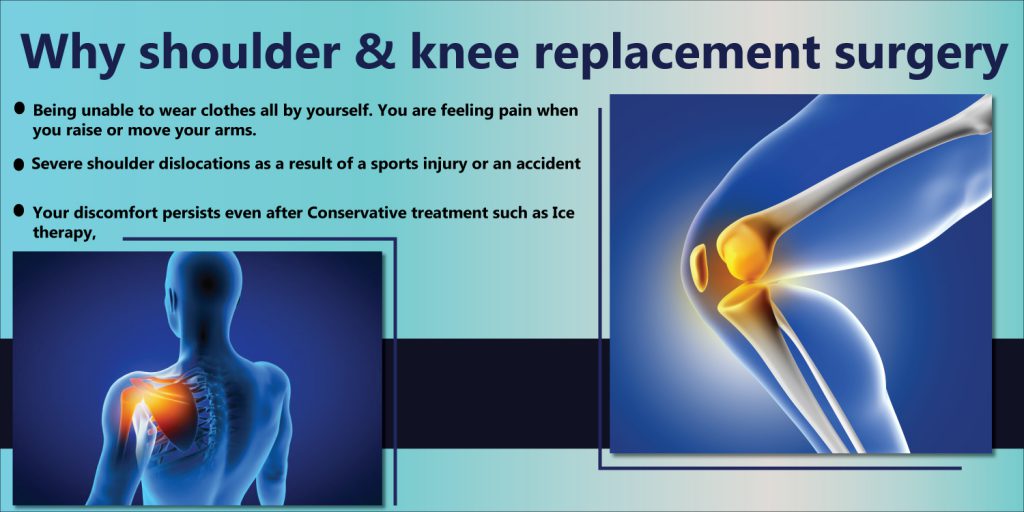
Shoulder Replacement Surgery
Shoulder replacement surgery eliminates pain and restores the shoulder’s flexibility, strength, and function. If all other choices for treating shoulder discomfort have been exhausted, your doctor may recommend a complete shoulder replacement. 95 percent of patients regain their natural shoulder strength and mobility one year after surgery.
If you have severe osteoarthritis and are unable to do simple daily movements with your arm, you should seek medical advice and learn about your surgical options. Along with alleviating your pain, the operation will increase your arm strength and movement.
Common symptoms that signal the need for a shoulder replacement
- Being unable to wear clothes all by yourself. You are feeling pain when you raise or move your arms.
- Severe shoulder dislocations as a result of a sports injury or an accident
- Pain even while you are resting.
- Your shoulder is stiff and less mobile.
- Your discomfort persists even after Conservative treatment such as Ice therapy, regenerative therapy, and steroid injections.
Knee Replacement Surgery
Knee replacement brings your life back to normal. It reduces pain, improves mobility, reduces the likelihood of comorbidities like obesity, and significantly improves the overall quality of life. Knee replacement surgery is a procedure that can be done at any age.
Common symptoms that signal the need for a knee replacement
There are always some clear symptoms. You may need a knee replacement surgery if:
- You have extreme discomfort and stiffness around your knee joints, which prevents you from doing everyday activities such as walking, running, and so on.
- You have had a sports injury recently.
- While resting at any time of day or night, you experience moderate to severe knee soreness later.
- You’ve experienced knee soreness and inflammation for a long time that hasn’t gone away despite rest and treatment.
Is shoulder & knee replacement surgery dangerous?
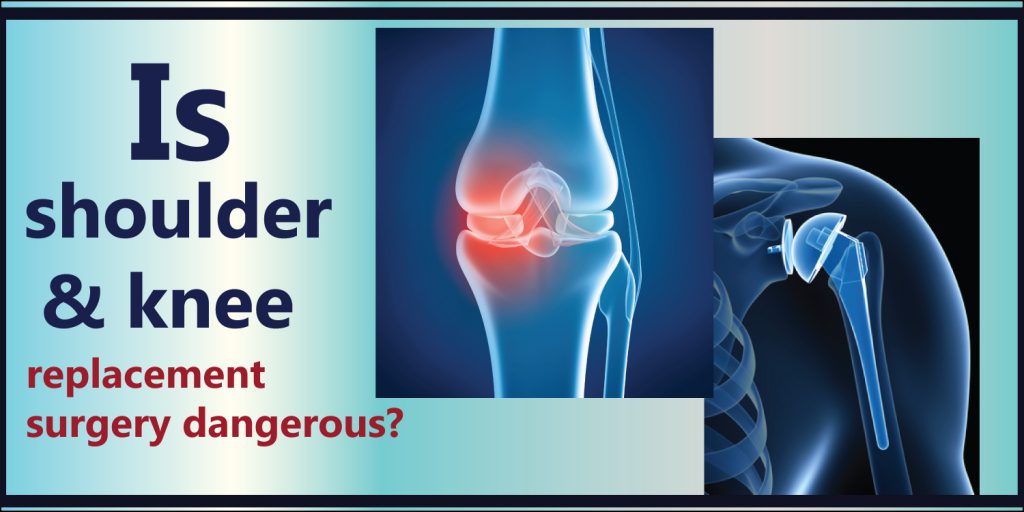
Shoulder and knee replacement surgery are now minimally invasive and painless, thanks to advances in medical research and technology. After knee and shoulder pain surgery, the risk of nerve injury is very minimal.
Those who have a shoulder arthroplasty to treat chronic or severe pain may have fewer post-surgery complications and shorter hospital stays than patients who get a knee replacement.
Your preparation is crucial to the success of the procedure. Any medications or nutritional supplements you’re currently taking should be disclosed to the surgeon.
It’s also critical that you visit top-rated and experienced surgeons. The long-term dangers of shoulder and knee replacement surgery will be considerably reduced as a result of this.
How painful is shoulder & knee replacement?

You will be given an anaesthetic to keep you pain-free during the surgery. You may experience discomfort, swelling, and bruising following surgery.
Following a knee replacement, it’s common to experience new sensations and feelings around the knee. Skin numbness on the outside of your knee and a “pins and needles” sensation around the incision are possible adverse effects. Medication, cold packs, elevation, and physical therapy can all aid with pain relief and speed up healing.
In the case of a shoulder replacement, the majority of patients are pleased with the level of pain alleviation. The implants, however, are not flawless and may cause discomfort when the weather changes or if you become overly active.
When is surgery the best course of action?

When it comes to effectively diagnosing and treating disorders of the joints, muscles, and bones, an orthopedic specialist is the best place to start.
The patient decides whether or not to have surgery based on how much pain and movement are interfering with his or her daily life.
If done on time and under the supervision of an expert and experienced surgeon, knee and shoulder pain surgery can have a life-changing impact.
Find the best knee and shoulder replacement surgeons near you now! Fill out this form now.
Which shoulder & knee replacement is best?
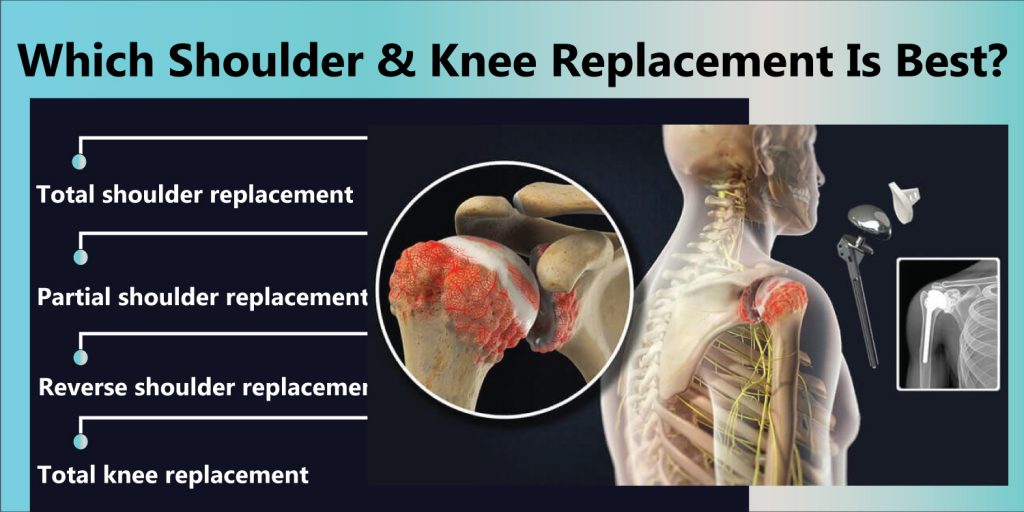
Shoulder replacement surgery can be divided into three categories:
- Total shoulder replacement: A metal ball and a plastic socket are used to replace the arthritic joint surfaces.
- Partial shoulder replacement: Only the arm bone is replaced with a metal implant. The shoulder joint is left intact.
- Reverse shoulder replacement: The implants are placed the other way round (opposite to conventional replacement) and implants are made from opposite materials.
Your doctor will determine the best treatment for you depending on the shoulder pain and mobility. The most commonly prescribed treatment is total shoulder replacement. However, reverse shoulder replacement surgery is preferred in case of unrepairable large tears, fractures, or nerve problems.
Knee replacement surgery is primarily of four types:
- Total knee replacement (most common)
- Partial knee replacement: An alternative to total knee replacement when only a small portion of the knee has arthritis
- Kneecap replacement: A short surgical procedure when only t the kneecap is damaged
- Revision knee replacement: Suggested when infections occur from a total knee replacement
How much does knee and shoulder replacement cost?
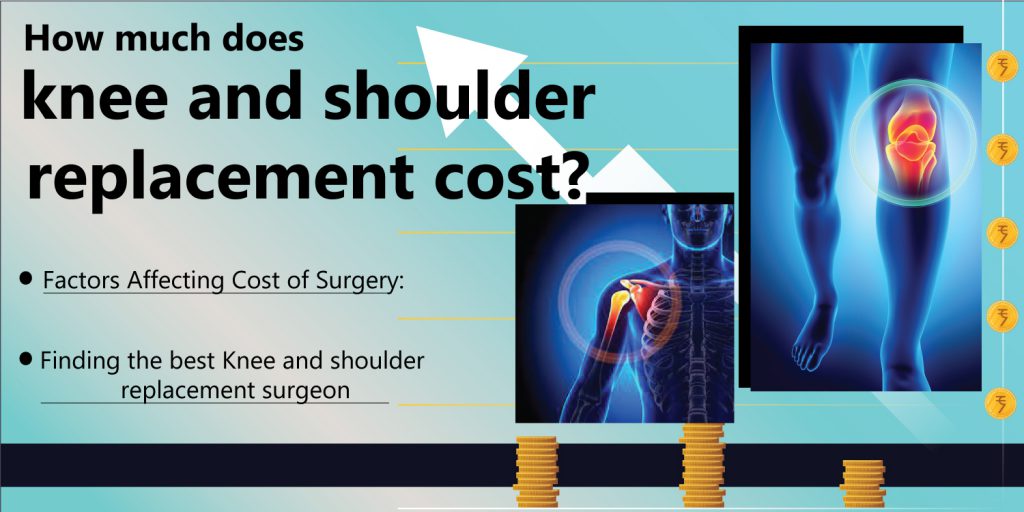
For Shoulder Replacement
Shoulder replacement costs anything from $6,000 to $22,000 on average. The hospitalization would last between 5 and 8 days. Shoulder surgery can cost up to $50,000 on rare occasions, but this is exceptional. The majority of shoulder arthroplasty short-term (90-day) costs are operative costs.
Factors Affecting Cost of Surgery:
- Patient’s Health Status
- Technique and equipment used
- Requirement of additional corrections in the shoulder
For best cost estimation, call our experts for free.
For Knee Replacement:
Total Knee replacements costs depend on the osteoarthritis severity and the surgeon you choose. In the US, a knee replacement surgery can cost up to USD 50,000. Knee replacement costs in India, a cost-effective medical tourism hub, can be between ₹1.5 lakh to ₹2.3 lakh. Factors affecting the cost include Prosthesis cost, Surgery cost (single or double knee), Post-surgery costs such as consultations and physiotherapy.
Finding the best Knee and shoulder replacement surgeon
For the best shoulder pain & knee replacement surgeon, keep the following points in mind:
- Verify the expert’s credentials
- Read reviews and feedback online
- Verify your surgical certification.
- Examine the number of procedures performed, as well as the complication rates.
After you’ve created a list of potential surgeons, make an appointment for them to evaluate your case and for you to evaluate them. Here are some questions you should be sure to ask.
- Is replacement possible using minimally invasive surgery?
- What percentage of these procedures require open surgery versus minimally invasive procedures?
- What are the variations in complication rates?
- What would be the duration of the hospital stay?
- Do you have a lot of experience with this procedure and do you specialize in it?
- What issues have you had to deal with?
- What are the post-surgery risks that I should be careful about?
How to finalize your surgeon?

Get in touch with people who were previously treated by the surgeon. Ask them about their experience, shoulder and knee replacement recovery time, and post-surgery complications. Get a second opinion from your family doctor or experts you know.
Can you have shoulder and knee surgery at the same time?
If you need a shoulder replacement as well as a knee replacement, your doctor will likely not be able to replace the knee until at least three months after the shoulder is replaced.
Shoulder & Knee Replacement Tests
Your doctor may conduct tests to determine the source of your discomfort and any underlying issues. The following are some of the tests that your doctor may recommend:
- X-rays are used to detect joint injuries in the shoulder or knee.
- Ultrasound and magnetic resonance imaging (MRI) are used to detect ligament and tendon damage.
- To get a very detailed observation of the knee and shoulder pain area, a computed tomography (CT) scan is used.
- To assess nerve function, an EMG (electromyogram) is used.
- Arthroscopy: This procedure is used to detect soft tissue injuries that are not visible on physical examination, x-rays, or other diagnostics.
Note that, in addition to assisting in the identification of the source of pain, arthroscopy may also be utilized to rectify the issue.
How successful is shoulder & knee replacement?

Shoulder replacement is a highly successful procedure. The success rate is nearly 90%. Most patients recover exceptionally well. Following surgery, shoulder replacement exercises play a key role in accelerating recovery time. They can resume normal daily activities as well as enjoy activities like swimming, cycling, etc.
A Knee replacement surgery has a 95 percent success rate. Depending on the quality of implants, the artificial knee joint might last up to 20 years.
Shoulder & knee replacement Recovery
Complete recovery from shoulder replacement can take anywhere from three to six months to heal. Irrespective of the knee replacement age, with rehab activities, you’ll regain your strength and mobility in no time. You may be able to return to work as soon as 2 to 3 weeks after surgery, depending on your job, as long as you avoid specific activities suggested by your surgeon.
People who have undergone knee replacement can resume normal daily activities within 6 weeks. For knee replacement recovery, you will need to undergo physical therapy (rehab). It can take anything from 4 to 6 months to a year to complete. Exercise and therapy reduces
Knee replacement recovery time considerably.
Conclusion
Awareness about knee and shoulder problems is a must if we want to enjoy life as normal. We hope the information we shared was helpful. Hope you find the best solution for knee and shoulder pain.
